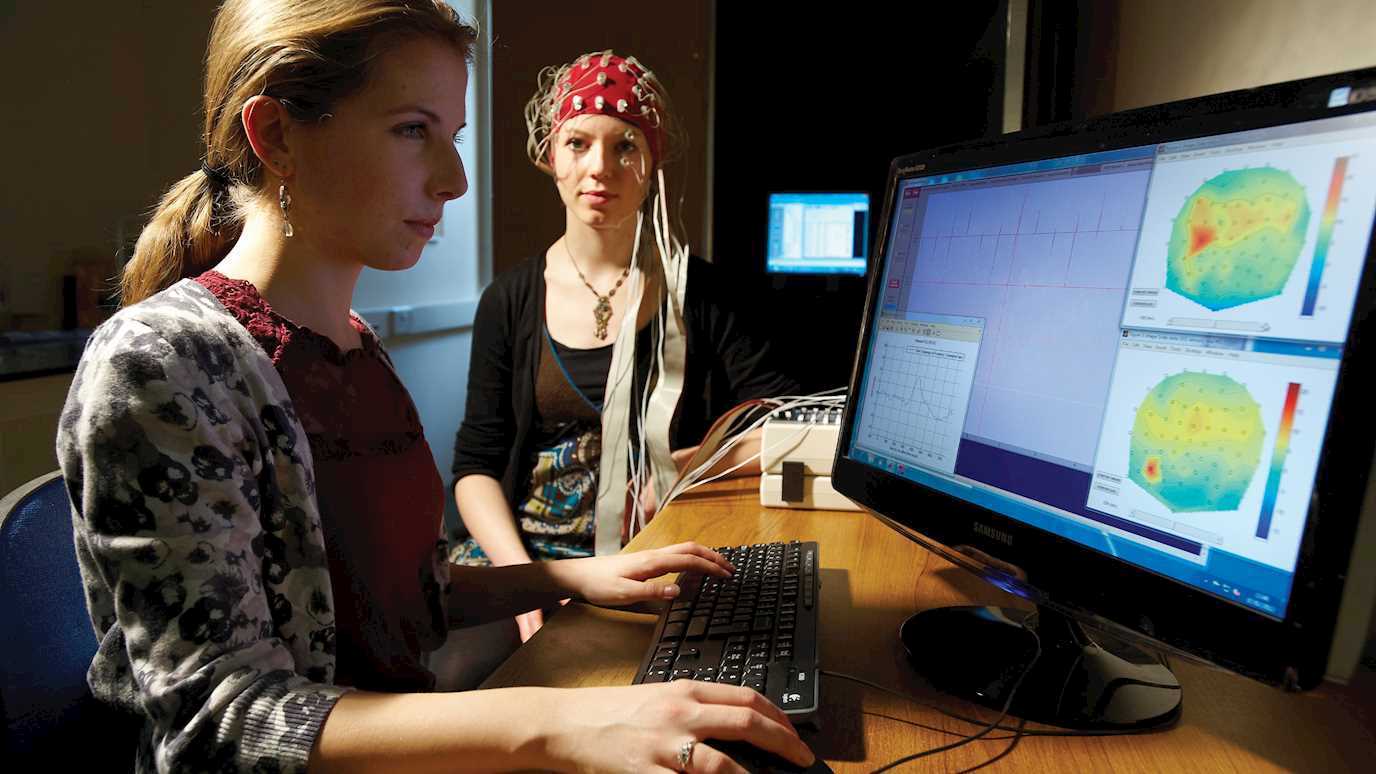Psychology is one of the leading research departments in the UK. In the most recent Research Excellence Framework (REF 2014) we were ranked 6th out of 82 Psychology departments for our world-leading and internationally excellent research.
The Department of Psychology (established 1985) is a thriving research-led unit within the School of Life Sciences and the Environment (established 2019). Our REF2014 submission demonstrated the excellence of our research: 51% of research outputs and 73% of our impact were judged to be world-leading. In REF2014, our submission to UoA4 ‘Psychology, Psychiatry & Neuroscience was ranked 6th in the UK according to Times Higher Education.
During the 2014-2020 period, we supported the research potential of our colleagues with the values of inclusivity, equality, transparency and shared endeavour in mind. We have further enhanced our research quality and reputation across existing strengths in cognitive psychology and cognitive neuroscience, but also in new areas such as social-affective neuroscience, decision-making and developmental neuroscience, and mental health. We have made significant investments in staffing and infrastructure, developed and refined support mechanisms to enable high-quality research and impact, and enhanced structures for supporting career progression and development. We have led or played a key role in large cross-disciplinary and inter-disciplinary projects, including the StoryFutures ‘creative cluster’ (AHRC), Magna Carta Doctoral Centre (Leverhulme Trust) and Body & Image in Arts & Science (NOMIS Foundation). Our staff have been recognized nationally and internationally with prestigious awards and grants such as the ESRC Celebrating Impact Prize, EPS Mid-career award, EPS Prize lecture, ERC Consolidator Grant and Leverhulme Trust Major Research Leadership Award.
The vitality of our research environment derives not just from structures and investment, but also from our values. We have always considered it essential to support the research potential of all colleagues in a rich research culture that is highly inclusive and collaborative, operating with transparency and a strong sense of shared endeavour. Ours was one of the first three Psychology Departments to hold Silver Athena SWAN status (2012, renewed in 2016). Since 2014, we have taken substantial actions to address equality and diversity. We have also applied these values to our research by committing to the Open Science agenda for transparent and reproducible research.
As part of the newly-founded School of Life Sciences and Environment (LSE) and looking ahead to the future, our Department will continue to strengthen our world-leading research in our areas of expertise. Accordingly, we set the following major objectives :
(i) Scaling up disciplinary research. We are committed to the advancement of our discipline, to nurturing areas of excellence and doing so in a mixed ecology of challenge and investigator-led projects. We already have an impressive track record in producing world-leading research and impact in the areas of (a) language, literacy and learning (and (b) interoception and embodiment. Our vision is to capitalise on critical mass in these areas to scale up research and impact through larger-scale more ambitious collaborative grants, nationally and internationally.
(ii) Leadership in interdisciplinarity. The Schools structure at RHUL (established 2019) enables the Department to play a leading role in advancing the cross-disciplinary research capacity of psychology. We intend to continue and expand our leading role in advancing the cross-disciplinary research capacity of psychology across all Schools and beyond. First, we will consolidate existing cross-disciplinary collaborations with law, economics and social sciences and play a key role in the study of cognitive, behavioural and societal issues in two of the four main Research Catalysts created by RHUL: Transformative Digital Technologies, Security and Society and Digital Futures in the Creative and Cultural industries. Second, in 2021 we will inaugurate the Centre for the Politics of Feelings, supported by the NOMIS Foundation, and spanning psychology, neuroscience, political science and digital humanities. Third, we will integrate our expertise in mental health and well-being with leadership in digital technologies (e.g. StoryFutures) to develop effective and scalable therapeutic interventions. Our vision is to open up to other disciplines, within and beyond the School of Life Sciences & Environment, and act as a hub for challenge-led research in human cognition and behaviour and its impacts in different contexts, from climate change to digitalisation and from health-related behaviour to political behaviour. For this reason, we have introduced a new leadership role for developing interdisciplinary and challenge-led research.
(iii) Investing in and advancing our neuroimaging capabilities. Our neuroimaging capabilities are at the core of Departmental research and a research priority for the School. Post-2021, we will replace our MRI scanner and establish a new Neuroimaging Centre for Decision-Making & Choice. The Centre will capitalise on the expertise and talent of our recent appointments to address timely societal and policy questions across disciplines both within our School and beyond. In these challenging times, where there is unprecedented uncertainty about finance, politics, climate and health, our research will address important questions about the way people take decisions in today’s difficult conditions. This new Centre alongside the replacement of the scanner will ensure the sustainability and vitality of the frontiers neuroscience research that we have been conducting ever since we became the first UK Psychology Department to acquire a research-dedicated MRI scanner.
When you study here or collaborate with us as a researcher, you can look forward to exceptional research facilities, a supportive environment and the opportunity to work at the frontiers of psychological knowledge.
























